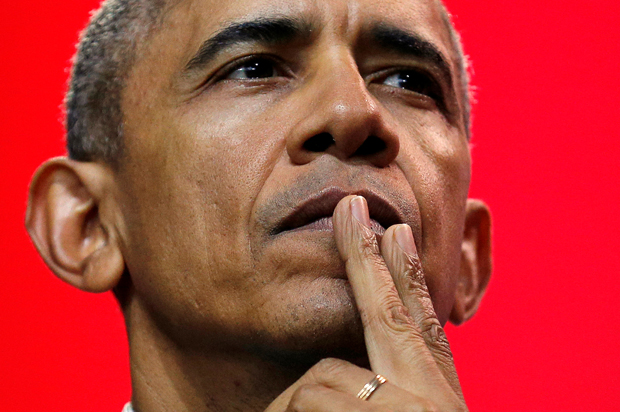Center stage at the Democratic Convention in Philadelphia, Barack Obama congratulated himself last week on the state of the economy and the nation, but the facts tell a far different story, as evidenced by weak GDP growth this quarter, and as Zero Hedge points out, the fact that Obama could be the only president in post-World War II history to never preside over at least one year in his term with a 3 percent GDP growth rate.
While would-be successor Hillary Clinton is trying to pick up the baton of Obama’s legacy, it’s clear that the American people aren’t buying it. Why on earth would someone so flawed as Donald Trump be polling so well if Americans actually believed that Obama had made their lives better? It’s clear that many millions of Americans are channeling economic frustration with the Obama legacy, yet the President’s speech did nothing to acknowledge their concerns. Trump certainly is unfit for the presidency, but he embodies the outrage that many feel toward an Oval Office utterly disconnected from economic realities, both current and future.

Source: Bureau of Economic Analysis
In his speech, Obama touted that unemployment was down, but this is obscured by the fact that under-employment has been on the rise and that discouraged workers are leaving the workforce. This is the least-employed American population in a generation. That’s why Jim Clifton, chairman and CEO at Gallup, penned a not-subtly titled op-ed called “The Big Lie: 5.6% Unemployment,” excoriating the White House:
The media loves a comeback story, the White House wants to score political points and Wall Street would like you to stay in the market. None of them will tell you this: If you, a family member or anyone is unemployed and has subsequently given up on finding a job — if you are so hopelessly out of work that you’ve stopped looking over the past four weeks — the Department of Labor doesn’t count you as unemployed. That’s right. While you are as unemployed as one can possibly be, and tragically may never find work again, you are not counted in the figure we see relentlessly in the news — currently 5.6%. Right now, as many as 30 million Americans are either out of work or severely underemployed. Trust me, the vast majority of them aren’t throwing parties to toast “falling” unemployment.
There’s another reason why the official rate is misleading. Say you’re an out-of-work engineer or healthcare worker or construction worker or retail manager: If you perform a minimum of one hour of work in a week and are paid at least $20 — maybe someone pays you to mow their lawn — you’re not officially counted as unemployed in the much-reported 5.6%. Few Americans know this.
Yet another figure of importance that doesn’t get much press: those working part time but wanting full-time work. If you have a degree in chemistry or math and are working 10 hours part time because it is all you can find — in other words, you are severely underemployed — the government doesn’t count you in the 5.6%. Few Americans know this. There’s no other way to say this. The official unemployment rate, which cruelly overlooks the suffering of the long-term and often permanently unemployed as well as the depressingly underemployed, amounts to a Big Lie.
Then there’s the doubling of our national debt under Obama’s watch — he literally doubled the amount of public debt in one presidency compared to all previous presidents combined. In Philly, Obama also conveniently ignored this in his glowing speech. What this means is that my Millennial generation will be cleaning up Obama’s mess for decades to come. As The Wall Street Journal reported, America’s interest costs are around $200 billion a year, but as interest rates gradually rise, this will grow to nearly $800 billion a year by this decade’s end.
The Journal’s Josh Zumbrun also reports that by 2021, the White House’s own forecasts show that America will be spending more on interest than on all national defense, and by the following year, interest costs will exceed nondefense discretionary spending. Obama will be crowding out his own prized domestic and international government programs by hobbling our country with interest payments.
Obama’s convention speech was also far more partisan than Bill Clinton’s speech the previous night, reflecting Bill Clinton’s more reasonable approach to governance. That explains in part why Bill Clinton was able to work with Republicans to generate a budget surplus and pass entitlement reform that lifted millions of people out of poverty. While Bill Clinton helped reduce welfare rolls and help people on the path to economic independence, Obama ushered in an increase in welfare spending. The President somehow deems this as an accomplishment rather than a sign of economic distress.
That Obama would claim in the City of Brotherly Love that “even when you’re 100 percent right, getting things done requires compromise” yet not once illustrate any sort of compromise in his speech is all you need to know about how he governed. He believed himself to be intransigently correct, which is why Congressional Republicans had such difficulty working with him. Where Bill Clinton in Philly was able to specifically pinpoint multiple areas of bipartisan compromise—by his wife alone, no mention of himself—such vignettes were completely absent from the Obama lecture.
Rhetorically in his 2004 Boston convention speech, Obama said he didn’t want Red or Blue states, and yet he governed just the opposite. This no doubt contributes to why our country is so divided and why Trump has risen on a backlash to the Obama divisiveness. Obama never took Red State concerns seriously, and that’s why Red State Americans feel so isolated and angry.
The president still has time to bring them in from the cold, but his Philadelphia speech suggested a president still on the path toward executive overreach that Congress and the courts will continue to curtail.

